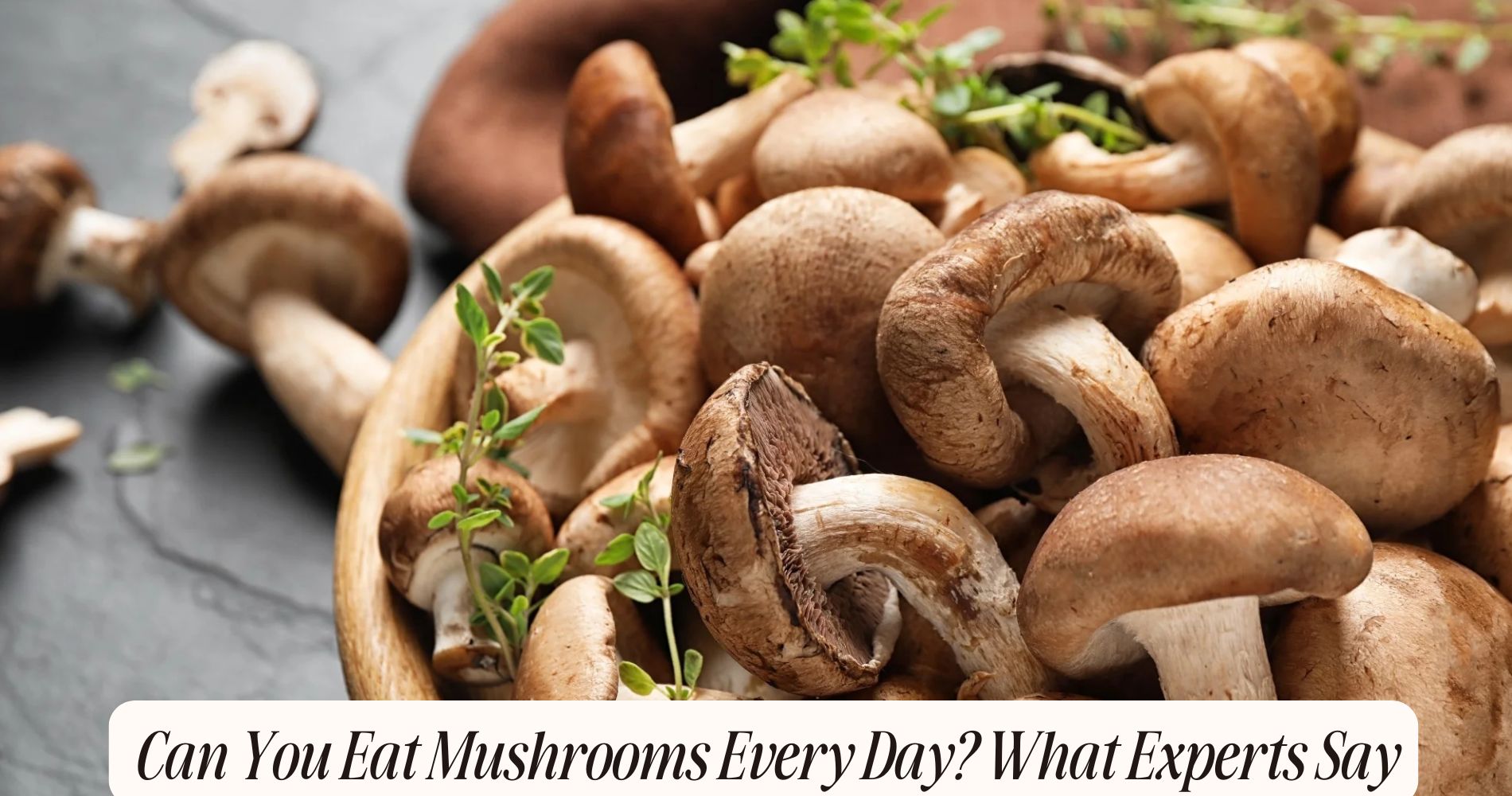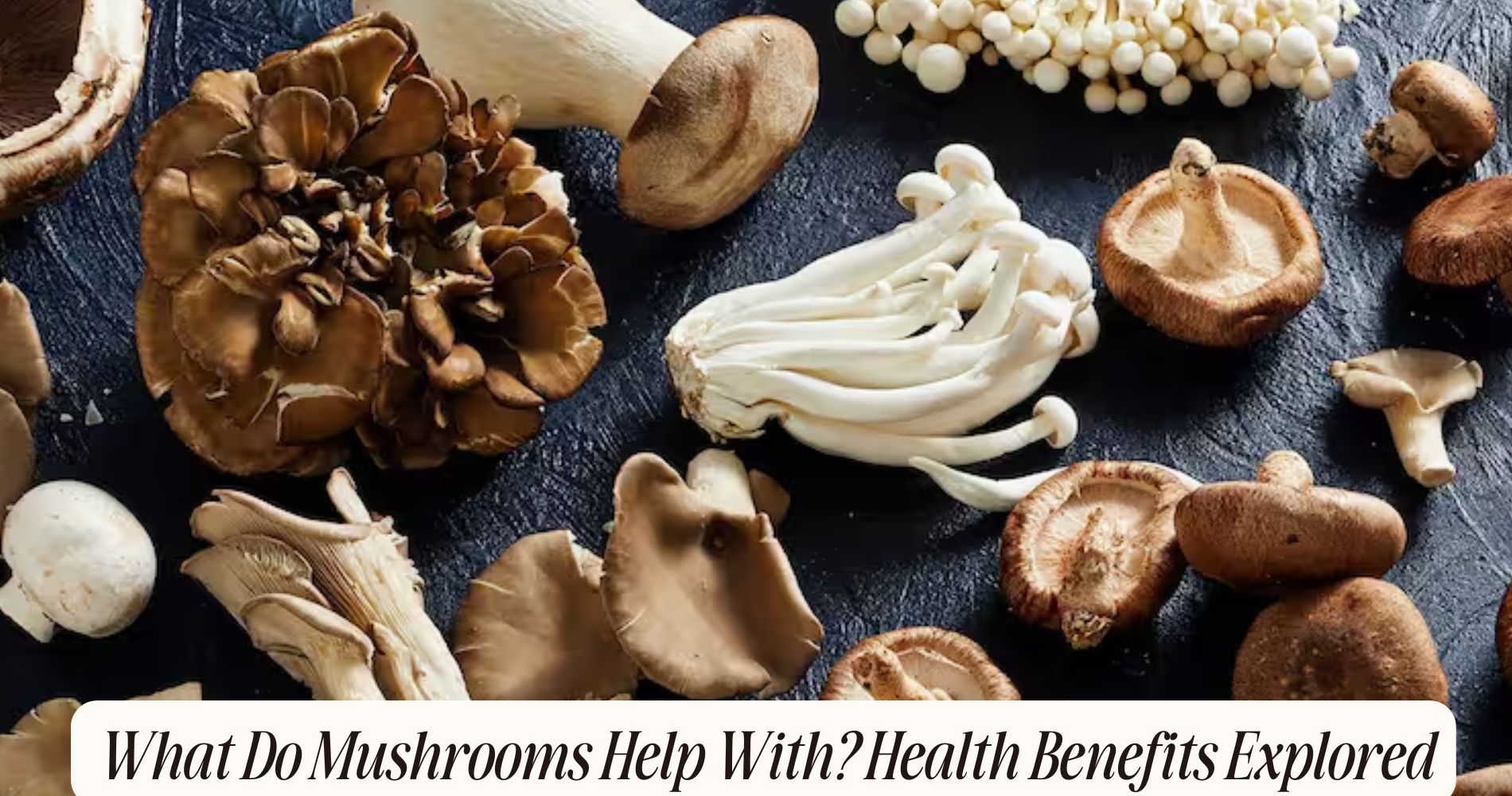
Can You Eat Mushrooms Every Day? What Experts Say
Can you eat mushrooms everyday? Yes, you can eat mushrooms every day, and they can greatly boost your health. They're low in calories and packed with essential nutrients, supporting heart health, gut health, and immune function. Nutrition experts recommend consuming about one cup of cooked mushrooms daily, but you should consider your tolerance and any allergies. Be cautious with wild mushrooms, as some can be toxic. Sourcing organic or local varieties helps minimize risks. Incorporating different types and cooking methods can enhance your culinary experience. For more insights on how to enjoy mushrooms safely and deliciously, there's plenty more to explore.
Nutritional Benefits of Mushrooms
Mushrooms are a nutritional powerhouse that can greatly enhance your diet. They're low in calories yet rich in essential nutrients, making them an excellent addition to your meals.
When you consider variety selection, you'll find that different types of mushrooms offer unique health benefits. For instance, shiitake mushrooms are known for their immune-boosting properties, while portobello mushrooms are high in fiber and B vitamins.
In terms of cooking methods, mushrooms are incredibly versatile. You can sauté, grill, or roast them to enhance their flavor while retaining their nutritional value.

Incorporating mushrooms into your diet can help you meet your daily requirements for vitamins D and B, selenium, and antioxidants. Research suggests that these nutrients can support heart health, improve gut health, and even contribute to cancer prevention.
It's essential to experiment with various mushroom types and cooking techniques to maximize their benefits. Try adding them to salads, stir-fries, or soups to enjoy their rich flavors and textures.
Potential Risks of Daily Consumption
While incorporating mushrooms into your daily diet can offer numerous health benefits, it's important to be aware of potential risks associated with their regular consumption. One of the primary concerns is toxicity. Certain wild mushrooms can be highly toxic, and misidentification can lead to severe health issues, including liver damage or even death.
If you're foraging for mushrooms, make sure you're well-informed or consult an expert to avoid any mishaps.
Another risk is the possibility of allergic reactions. Some individuals may develop hypersensitivity to specific mushroom varieties, leading to symptoms like rashes, nausea, or respiratory issues.
If you've never eaten a certain type of mushroom before, introduce it gradually and pay attention to how your body reacts.
Additionally, mushrooms can absorb toxins from their environment, including heavy metals and pesticides. Consuming contaminated mushrooms might pose health risks over time, particularly if you're eating them daily.
It's advisable to choose organic or locally sourced mushrooms when possible to mitigate these concerns.
Expert Opinions on Daily Intake
Numerous nutrition experts agree that incorporating mushrooms into your daily diet can be beneficial, provided you choose the right types and quantities. Different mushroom varieties offer unique health benefits, including antioxidants, vitamins, and minerals.
For instance, shiitake mushrooms are known for their immune-boosting properties, while maitake mushrooms may help regulate blood sugar levels. Experts often recommend consuming a variety of mushrooms to maximize these health benefits.
Regular intake can support heart health, enhance nutrient absorption, and even contribute to weight management due to their low-calorie content. However, it's important to be mindful of portion sizes. Most nutritionists suggest aiming for about one cup of cooked mushrooms per day as a reasonable amount.

Additionally, it's vital to source your mushrooms from reputable suppliers, as some wild varieties can be toxic. If you're considering daily consumption, consulting with a healthcare provider or a registered dietitian can help tailor your choices to your specific health needs.
Types of Mushrooms to Consider
When exploring the diverse world of fungi, you'll find that certain types of mushrooms stand out for their unique health benefits. For instance, shiitake mushrooms aren't only popular in Asian cuisine but also packed with essential nutrients, including B vitamins and antioxidants. Their culinary uses extend from soups to stir-fries, making them a flavorful addition to your diet.
Another remarkable option is the portobello mushroom. This meaty edible variety can serve as a fantastic meat substitute in burgers, providing a rich umami flavor while being low in calories.

Similarly, oyster mushrooms are versatile, offering a delicate taste and a variety of cooking applications, from sautéing to grilling.
If you're looking for something with additional health perks, consider reishi or lion's mane mushrooms. While primarily known for their medicinal properties, they can be incorporated into teas or supplements.
Ultimately, embracing a variety of edible mushrooms can enhance not just your meals but your overall health. By incorporating these diverse types into your diet, you can enjoy their unique flavors and health benefits.
How to Incorporate Mushrooms Daily
Incorporating mushrooms into your daily diet can be both simple and rewarding. Start by adding mushrooms to your breakfast; sauté some in olive oil and toss them into scrambled eggs or an omelet. You'll not only enhance the flavor but also boost your nutrient intake.
For lunch, consider using mushrooms in salads or sandwiches. Try a portobello mushroom cap as a hearty substitute for a burger, or slice shiitake mushrooms to mix into a quinoa salad.
At dinner, the options are endless. You can create various mushroom recipes like a creamy mushroom risotto or a savory stir-fry. Different cooking techniques will bring out unique flavors; roasting or grilling mushrooms can add a delightful smokiness, while simmering them in soups provides a rich umami taste.
Don't forget about snacks! Air-fried mushroom chips make for a healthy and crunchy option.
Conclusion on Daily Mushroom Consumption
As you consider adding mushrooms to your daily diet, it's important to weigh their nutritional benefits against potential health risks.
Understanding the recommended daily intake can help you maximize their advantages while minimizing any adverse effects.
Nutritional Benefits Overview
Daily mushroom consumption offers a wealth of nutritional benefits that can enhance your overall health. These fungi are low in calories yet rich in essential nutrients, making them a smart addition to your daily diet. Different mushroom varieties, such as shiitake, portobello, and cremini, provide unique flavors and textures, allowing you to enjoy a diverse culinary experience.
Mushrooms are an excellent source of vitamins and minerals, including B vitamins, selenium, and potassium. They also contain antioxidants that help combat oxidative stress and support your immune system. With their high fiber content, mushrooms can promote digestive health and contribute to a feeling of fullness, which may assist in weight management.

When it comes to cooking methods, you can sauté, grill, or even roast mushrooms to enhance their natural umami flavor. Experimenting with various culinary techniques can help you appreciate the versatility of mushrooms while reaping their nutritional benefits.
Incorporating mushrooms into your meals regularly not only adds taste but also boosts your intake of essential nutrients, contributing to your overall well-being. So, consider making mushrooms a staple in your diet for a flavorful and healthful boost.
Potential Health Risks
While mushrooms are generally safe and nutritious, there are some potential health risks to contemplate when consuming them daily. One concern is the possibility of mushroom allergies. Though rare, these allergies can lead to symptoms like hives, digestive issues, or even anaphylaxis in severe cases. If you notice any adverse reactions after eating mushrooms, it's essential to consult a healthcare professional.
Another risk involves the consumption of toxic varieties. While many mushrooms are safe to eat, some can be extremely harmful or even fatal. Foraging for wild mushrooms without proper knowledge can lead to accidental poisoning. Always verify that the mushrooms you consume are sourced from reputable suppliers or are well-identified if foraged.
Additionally, if you have underlying health conditions or are on certain medications, it's wise to seek advice from a healthcare provider regarding daily mushroom consumption.
Though mushrooms boast numerous health benefits, being aware of these potential health risks will help you make more informed choices. Balance is key; moderation in your diet guarantees you can enjoy the advantages of mushrooms while minimizing any health concerns.
Recommended Daily Intake
When considering how many mushrooms to include in your daily diet, aiming for a moderate intake is essential. Most experts recommend a daily serving of about one cup of cooked mushrooms, which roughly translates to 70-100 grams, depending on the type. This amount provides a balance of essential nutrients while minimizing potential risks associated with excessive consumption.
Mushrooms are packed with vitamins, minerals, and antioxidants, making them a valuable addition to your meals. By consuming them in this ideal quantity, you can enjoy their health benefits, such as improved immune function and reduced inflammation, without overwhelming your system.
However, it's vital to be mindful of any personal sensitivities or allergies. Some individuals may experience digestive issues with larger quantities.
Pay attention to how your body responds and adjust your intake accordingly.
Frequently Asked Questions
Can Mushrooms Interact With Medications or Supplements?
Mushrooms can interact with certain medications or supplements, potentially affecting their efficacy. While you'll enjoy mushroom benefits and their medicinal properties, it's crucial to consult your healthcare provider to guarantee safe consumption alongside your treatments.
Are There Specific Mushrooms to Avoid Daily?
While many mushrooms offer health benefits and culinary uses, avoid those like the fly agaric or death cap daily. Stick to common varieties, ensuring you maximize flavor and nutrition without risking adverse effects. Always research unfamiliar types.
How Should Mushrooms Be Stored for Freshness?
To keep your mushroom varieties fresh, store them in a paper bag in the fridge, avoiding plastic. This method allows moisture to escape, preventing spoilage. Use proper storage techniques to enjoy their flavor and nutrients longer.
Can Mushrooms Be Harmful to Pets?
Mushroom toxicity can pose risks to pets, as some species are harmful. Always prioritize pet safety by keeping mushrooms out of their reach and consulting a veterinarian if you suspect your pet has ingested any.
What Are the Environmental Impacts of Mushroom Farming?
Mushroom farming can impact the environment, but sustainable practices enhance soil health. By using organic materials and minimizing chemical inputs, you can help support biodiversity, reduce pollution, and promote a healthier ecosystem while enjoying mushrooms.
Conclusion
Incorporating mushrooms into your daily diet can offer a range of nutritional benefits, from boosting immunity to providing essential vitamins. However, it's crucial to be mindful of potential risks, such as allergies or digestive issues. Experts generally agree that moderate consumption is safe for most people. By choosing a variety of mushrooms and preparing them in different ways, you can enjoy their flavors and health benefits while minimizing any concerns. Always consult with a healthcare professional if unsure.




